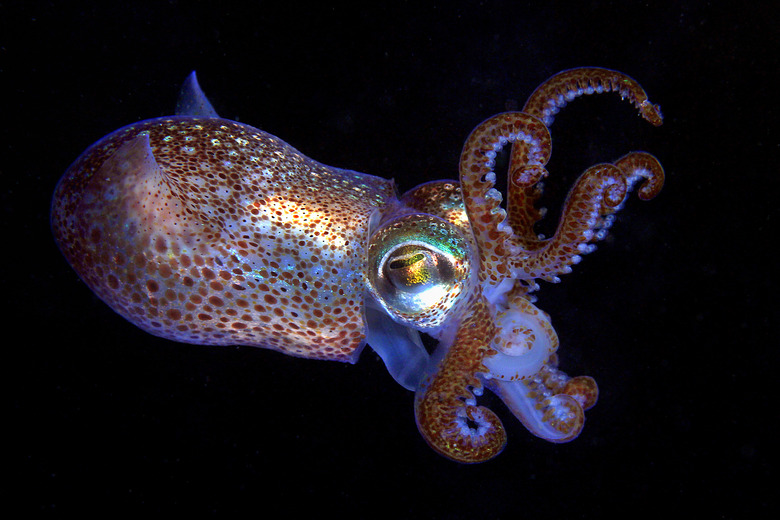These Squishy Sea Creatures Might Actually Thrive Under Climate Change
Squid: the cockroaches of the sea?
In a sense, yes, they might just be. A recent study published in the Oxford Academic Conservation Physiology journal demonstrates that squid may not only survive climate change, but thrive in it, leading to a potential increase in squid populations.
The Future for Squid
The Future for Squid
Blake Spady from James Cook University's ARC Centre of Excellence for Coral Reef Studies spearheaded this study, published in early June. He initially expected that as carbon dioxide levels rose in ocean waters, making the water more acidic, squid would react badly.
"Their blood is highly sensitive to changes in acidity, so we expected that future ocean acidification would negatively affect their aerobic performance," Spady said in a media release from the ARC Centre of Excellence. However, Spady's team discovered a different outcome for two species of tropical squid: two-toned pygmy squid and bigfin reef squid.
As scientists subjected the animals to carbon dioxide levels similar to those projected for the end of the century (approximately 900 parts per million), they found those two levels of squid "were unaffected in their aerobic performance and recovery after exhaustive exercise by the highest projected end-of-century [carbon dioxide] levels," according to Spady.
How the Experiments Worked
How the Experiments Worked
Spady and his Australia-based team studied the squid in question by placing them in continuous-flow water tanks in the aquarium at James Cook University, according to reporting from New Atlas. The scientists kept the squid in those tanks for a period of time equal to about 20-36% of their lifespan and raised the water's carbon dioxide levels to around 900 parts per million (ppm).
Even after sustaining "exhaustive exercises" for long periods of time, the squid performed and recovered as usual, seemingly unaffected by the high carbon dioxide levels in their environment. This indicated that the squid boast better blood oxygen binding than the scientists expected, which would allow them to survive an increase in ocean acidity.
In fact, this could mean an increase in the squids' populations, since their predators have been shown to lose performance under those same climate change scenarios.
"We think that squid have a high capacity to adapt to environmental changes due to their short lifespans, fast growth rates, large populations and high rate of population increase," Spady said in the center's release.
Why Does This Matter?
Why Does This Matter?
As climate change unfolds before our eyes, scientists are working to understand the rate at which changes might take place and how those changes might affect Earth's ecosystems. Atmospheric (and therefore oceanic) concentrations of carbon dioxide, for example, have increased from 280 ppm before the industrial revolution to over 400 ppm now, and current levels may more than double by the year 2100 unless we significantly reduce emissions.
Spady's work provides a window of understanding into how ocean ecosystems might function under those projected carbon dioxide levels.
"We are likely to see certain species as being well-suited to succeed in our rapidly changing oceans, and these species of squid may be among them," Spady said in the media release. "The thing that is emerging with most certainty is that it's going to be a very different world."
References
- New Atlas: Climate Change May Cause an Increase in Squid Populations
- ARC Centre of Excellence Coral Reef Studies: Squid Could Thrive Under Climate Change
- Oxford Academic Conservation Physiology: Aerobic Performance of Two Tropical Cephalopod Species Unaltered by Prolonged Exposure to Projected Future Carbon Dioxide Levels
Cite This Article
MLA
Swanston, Brenna. "These Squishy Sea Creatures Might Actually Thrive Under Climate Change" sciencing.com, https://www.sciencing.com/these-squishy-sea-creatures-might-actually-thrive-under-climate-change-13719453/. 19 June 2019.
APA
Swanston, Brenna. (2019, June 19). These Squishy Sea Creatures Might Actually Thrive Under Climate Change. sciencing.com. Retrieved from https://www.sciencing.com/these-squishy-sea-creatures-might-actually-thrive-under-climate-change-13719453/
Chicago
Swanston, Brenna. These Squishy Sea Creatures Might Actually Thrive Under Climate Change last modified March 24, 2022. https://www.sciencing.com/these-squishy-sea-creatures-might-actually-thrive-under-climate-change-13719453/
